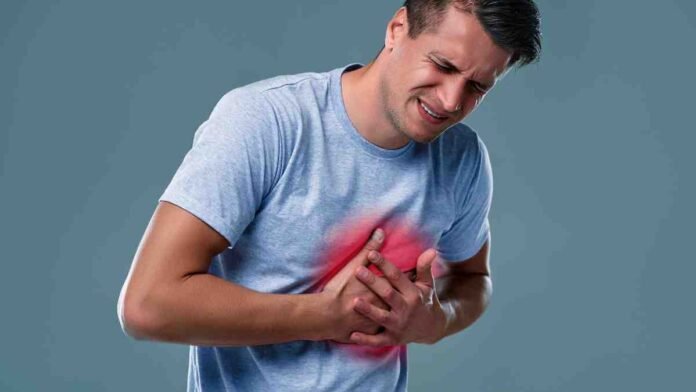A myocardial infarction, another name for a heart attack, happens when the heart’s blood supply is cut off, depriving the heart muscle of oxygen. This can cause serious harm and perhaps death if it is not treated right away. It’s critical to recognize the early warning signs of a heart attack since prompt medical attention can save lives. These are the main signs and symptoms you should never overlook.
1. Chest Pain or Discomfort
Any discomfort or pain in the chest is the most typical warning sign of a heart attack. In the centre or left side of the chest, this sensation is frequently reported as pressure, squeezing, fullness, or pain. The pain may subside and then return, or it may persist for longer than a few minutes. It is an obvious indication that there is a problem with the heart since it can feel like a large weight pushing down on the chest.
2. Pain in Other Areas of the Body
The chest isn’t the only place where heart attack discomfort can occur. The back, neck, jaw, stomach, and arms—typically the left arm—can all experience radiating pain. If you get sudden, inexplicable pain in these locations, you should think about having a heart attack. Some individuals may confuse this discomfort for other conditions like indigestion or a torn muscle.
3. Shortness of Breath
Another important warning sign of a heart attack is shortness of breath, which can happen with or without chest pain. It could feel like you’re having trouble breathing deeply or that you can’t catch your breath. This symptom may appear at rest or when engaging in physical exercise. Should you suddenly feel breathless without any apparent connection to physical activity, it may indicate a heart attack.
4. Cold Sweat
Sweating profusely is an uncommon but potentially dangerous sign of a heart attack. Sweating from exercise or the heat is not the same as this. Rather, it’s a sudden, clammy sweat that can come on top of other symptoms like shortness of breath or chest pain. See a doctor right once if you find yourself perspiring a lot for no apparent reason, especially if you are experiencing other symptoms.
5. Nausea, Indigestion, or Stomach Pain
The main symptoms for some heart attack victims—especially women—may be nausea, dyspepsia, or stomach pain. These symptoms can be misdiagnosed as acid reflux or food poisoning. Nonetheless, it’s important to take a heart attack seriously if you have severe or abrupt dyspepsia in addition to other possible heart attack symptoms.
6. Lightheadedness or Dizziness
Dizziness or lightheadedness may potentially be a warning indication of a heart attack. This could happen in addition to other symptoms like breathlessness or chest pain. Fainting can occasionally result from dizziness. It’s crucial to get emergency care if you suddenly feel lightheaded or dizzy for no apparent reason, especially if you’re also experiencing other heart attack symptoms.
7. Fatigue
Particularly in women, unusual or inexplicable weariness may indicate a heart attack. This weariness might start off slowly or suddenly, and it can get bad enough to interfere with everyday tasks. An imminent heart attack may be indicated if you experience extreme weariness for no apparent reason and if it is accompanied by additional symptoms like shortness of breath or chest pain.
Conclusion
Heart attacks are serious medical issues that need to be treated right away. Understanding the warning indicators can be crucial. Possible heart attack symptoms include cold chills, nausea, lightheadedness, radiating pain to other regions of the body, chest pain, shortness of breath, and inexplicable weariness. Never disregard these signs; prompt action could prevent death.



